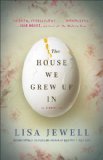Write your own review!
techeditor
Growing Up in the House of a Hoarder
Lisa Jewell has outdone herself with THE HOUSE WE GREW UP IN. Although I normally prefer thrillers, which Jewell excels at writing and which I mistakenly thought this was, THE HOUSE WE GREW UP IN is riveting and had me glued to the pages as much as any thriller.
The house is beautiful in a beautiful neighborhood with other beautiful houses. But Lorelei loves things: bright things, colorful things, potentially useful things, things in bulk, all sorts of things. And all are things she just can't throw out.
Lorelei and Colin have four kids who grow up in this house of more and more things that their mother can't
…more throw out. Each of their lives is examined over the years, and we see how the house they grew up in and their mother's madness affected them and their decisions.
I highly recommend this book. (less)In this book, Lisa Jewell introduces an idyllic family that becomes dysfunctional and estranged after a tragedy strikes.
Not only does Jewell use flashback to tell each character's story; but uses emails between the mother and her lover as an update.
This book would make a good Book Club choice because the book covers many topics : secrets, mental illness, relationships, hoarding, death, and tragedy reactions.
Carole V. (West Linn, OR)
Don't start it in the evening....
I made the mistake of starting it late in the day. I got very little sleep that night! This covers the Bird family over a 30 year period; it includes, hoarding, mental illness, betrayal, lesbianism, incest, and extra-marital affairs. I first thought maybe the author was trying to include too much. But I must say that the book just got better and better. A really satisfying read. It would be a great book club pick.
Lesley M. (Mesa, AZ)
The House We Grew Up In
A great story about family dynamics, secrets that tear us apart and the ties that bring us back full circle.
I enjoyed getting to know the characters of this book; they were well described and easy to relate to. The plot is engaging and I really cared about the characters that grow as the story develops.
I believe any reader that likes books about family with a touch of dysfunction will find this book appealing. Book groups will have many themes to discuss as well.
Susan P. (Boston, MA)
I Wouldn't Want to Grow Up in That House
While the family in this very readable novel would be considered dysfunctional, there are characters to like, even as they struggle. No one really addresses the mental health issues of the hippie hoarding mother and her infantile, selfish ways; the fascinating parts are each family member's decision about to how to live his or her own life as a reaction. What characters do or not do is frustrating, but it was a compelling read. Makes me want to read her other novels.
Sarah N. (Corte Madera, CA)
Great Book...Hope my house never looks like that!
I think everyone fears living in a delicate situation. Lisa Jewell did an excellent job developing the characters in such a way that the reader really cares about them. I also enjoyed the addition of the Internet "dating/friend" of the Mother...it added an interesting insight to the Mother that we would not have had otherwise. In the end, keeping all of the stuff makes perfect sense.
Lauren T. (Orlando, FL)
The House We Grew Up In by Lisa Jewell
What a wonderful read this book is. The characters are well fleshed out, and the story is believable. Reading it feels like you're getting a glimpse into the lives of real people in an average family, gradually learning their secrets and watching them find out who they really are. I've said in past reviews that a book has made me want to read the author's other work. I'll be digging into Lisa Jewell's earlier novels immediately after reading this one.
Kay K. (Oshkosh, WI)
A House Can Define a Family
The House We Grew Up In is the story of a family rooted to a house through Lorelei, the mother. Lorelei is a spirit that delights in finding beauty in every little thing, and can't let go of the memories that "things" hold for her. When a devastating event occurs, the happy family fragments and falls apart. All but Lorelei leave the house. Lorelei can't leave. Each family member is broken and takes off in a different direction looking for a way to heal. In the end, it is again the house that calls them all home and helps them heal. I really enjoyed this book, I found the family very human. The author gives this
…more family life and shows how family love can prevail. (less)
